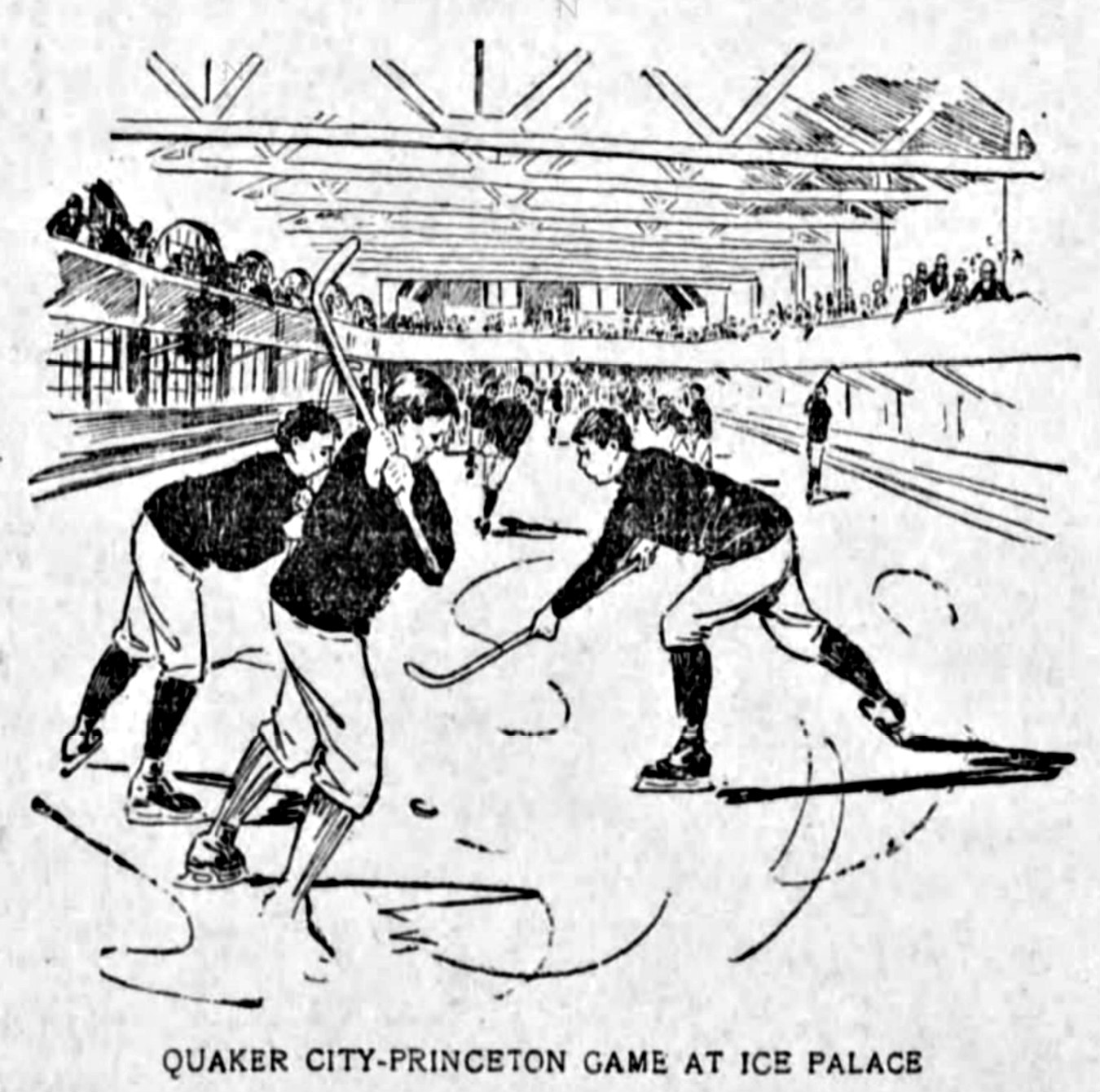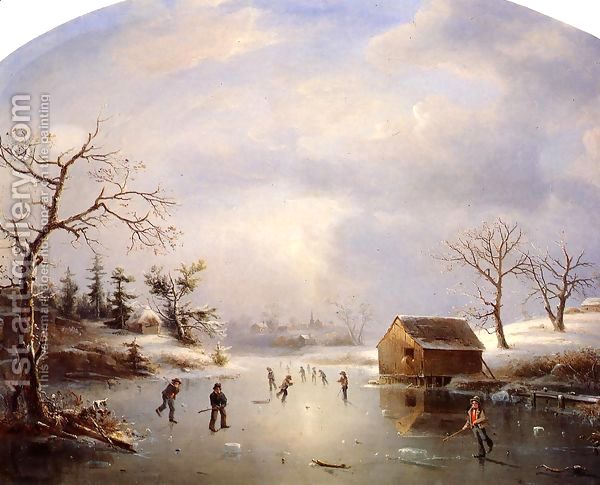
james laverance
-
Posts
162 -
Joined
-
Last visited
Content Type
Profiles
Blogs
Forums
Downloads
Gallery
Events
Support Us
Posts posted by james laverance
-
-
.jpg.c14f527289e2e5d43f537479c7d68679.jpg)
Tiny Thompson of the Boston Bruins has the Record for most saves in an NHL Playoff game with 121 in a Semi-final against the Toronto Maple Leafs in 1933 when Ken Doraty of Stittsville, Ontario put one by Thompson in the 6th Overtime.
In fact I was raised in Stittsville as a kid and remember a street sign name after me right behind our House named Doraty Lane.This is the original wtrie up on it including the box score.

-
The West Park Ice Palace AKA the Quaker City Rink opened in December of 1897 on 52nd and Jefferson streets.

A Philadelphia game from December 12, 1900, between home team Quaker City Hockey Club and the Princeton University team. Game finished 6-0 in favor of the Quaker City hockey clubbers. The arena burned down later the same season, in one of the earlier months of 1901.
-
A few excerpts regarding Ice-Hockey at Round Hill I found from 1823.
"Round Hill School, founded in 1823, in Northampton, Massachusetts, was the first prep school to introduce physical education into the curriculum. Under its gymnastics instructor—the first in a secondary school in the United States—Charles Beck, the school introduced such pastimes as horseback riding, gymnastics, bathing, dancing as prescribed recreations.A passel of other sports soon flourished at the school, including team sports like early forms of baseball and football, plus cross-country running, swimming, wrestling, and boxing.Winter sports included hockey, sledding, and ice skating.""In October, 1823, I was sent to the famous school at Round Hill, Northampton, then lately opened by Messrs. Cogswell and Bancroft. The grounds covered perhaps a hundred acres, with fine woodland and beautiful views of the Connecticut valley and of Mt. Holyoke and Mt. Tom. Mr. Cogswell was a learned man and a man of the world, and to him was largely due the breadth and liberality of the school, and its great success. The teaching was of no meagre kind, for Germany, Italy, France, and Spain each gave us of its best. But it was the pleasant and friendly relations of Mr. Cogswell and his masters with the boys, and the gymnastic and out-of-door education, which made Round Hill peculiar. The boys were taught to ride, had skating and swimming in their seasons, and wrestling, baseball, and football"
GYMNASTICS AT ROUND HILL, SCHOOL IN 1825.
"I am greatly indebted to the venerable Dr. George C. Shattuck, of Boston, who was a pupil at Round Hill, for the following account of the physical training pursued there."
"Dr. Beck, the teacher of Latin, afterward the professor of Latin in Harvard University, was the teacher of gymnastics. A large piece of ground was devoted to the purpose and furnished with all the apparatus used in the German gymnasia. The whole school was divided into classes, and each class had an hour three times a week for instruction by Dr. Beck. At the same time there were a dozen riding horses and classes for riding three times a week. Gardens were assigned the boys, in which they raised plants and vegetables. A piece of land was set apart for building huts. Baseball, hockey, and foot-ball were the games. I remember playing in a match game at the time of the Presidential election in which Adams and Jackson were candidates. The Jackson boys beat. You notice how much was done for physical training. I remember Mr. Edward Everett speaking at an annual exhibition and telling us how much better a school, how much greater advantages we enjoyed than Mr. Cogswell and himself had at Exeter. Though the school had only an existence of twenty years or less, and failed from want of pecuniary support, I believe that its influence has survived, and a great stimulus was given by it to the cause of education. Developing the bodily powers and strengthening the constitution were there first recognized as of great importance in the education of boys. The boys were very healthy. I only recall one death, from typhoid fever."
Circulars of Information of the Bureau of Education -
I think this was recorded in 1777-1778.
At the time the British possessed Philadelphia, in the winter of '77 and '78, the woods were so freely taken for the use of the army, that it was deemed most politic in the agent to cut them down and sell them. This was the business of one Adam Poth, a German of much self-consequence, well known to the city lads as a vigilant frustrater of many of their schemes to cut saplings, shinny-clubs, &c., in his woody domains.
Annals of Philadelphia and Pennsylvania, in the olden time -
This is the oldest written contemporary source I have found regarding Ice-Hockey from February 28th 1810 at Princeton's Mill-Pond.
-
Thank you hf101 and yes it is quite surprising that Penn doesn't have a div 1 hockey program any more.With all of it's History you think they would.
-
Hi I thought I'd provide some interesting links I found about Hockey in the Philadelphia area.The earliest reference I have dates back to the 1600's.The Seneca tribe used to play shinny on skates during the time of the white settlement in Philadelphia.Reading Eagle - Google News Archive SearchThis is from a book written in 1836 referring to Salem NJ in 1685...
" When the gay groups had finished their rounds in the village, the ice in front on the river was seen all alive with the small-fry of Elsingburgh, gambolling and skating, sliding and tumbling, helter-skelter, and making the frost-bit ears of winter glad with the sounds of mirth and revelry. In one place was a group playing at hurley, with crooked sticks, with which they sometimes hit the ball, and sometimes each other's shins. In another, a knot of slidersy following in a row, so that if the foremost fell, the rest were sure to tumble over him. A little farther might be seen a few, that had the good fortune to possess a pair of skates, luxuriating in that most graceful of all exercises, and emulated by some half a dozen little urchins, with smooth bones fastened to their feet, in imitation of the others, skating away with a gravity and perseverance worthy of better implements. All was fun, laughter, revelry, and happiness ; and that day, the icy mirror of the noble Delaware reflected as light hearts as ever beat together in the new world.
Such are supposed to have been the juvenile sports of New-year's day, in the Middle States, one hundred and fifty years ago."
https://archive.org/stream/festivalsgamesam00smit#page/332/mode/2up/search/Hurley+From the The memoirs of U.S Naval Hero Stephen Decatur as early as 1785."During the winter, when the glassy surface of the Schuylkill invited the boys to skim over it on the swift skates, no one excelled him in hurly, prisoner's base, and the other games of the season."Life of Stephen Decatur, a Commodore in the Navy of the United States - Alexander Slidell Mackenzie - Google Booksid=ONw5AAAAcAAJ&pg=PA13&dq=stephen+decatur+skating&hl=en&sa=X&ved=0ahUKEwj57N3l2dfOAhWE0h4KHV0MAJIQ6AEIGjAA#v=onepage&q=stephen%20decatur%20skating&f=falseAt Princeton in 1786.Hockey being played at Princeton in 1786 when it was called Shinny Hawkey or Hurley."Princeton, however, was more fond of "shinny," known also as "hawkey" andhurley," played with a hard ball and sticks having curved ends. The goalsconsisted of North College and the fence on the south side of the "campus.""The diary of 1786 contains several valuable allusions to College sports " hockey on Stony Brook in winter, shinny, quoits, ' ' baste ball, ' ' and *' prison baste " on the campus in the spring and summer.''"In the winter when the weather was cold and the ice firm the student might tuck his skates under his arm and set out for Stony Brook or the Millstone River.*If he were from the north and so at home on the ice, he often joined the other boys in a game played with a ball, *possibly hockey."1786, Princeton Library.The Deke Quarterly - Volume 51, Issue 2 - Page 731933 - Snippet view - p.206-7. Princeton - Forgotten BooksPrinceton, 1746-1896 [by] Thomas Jefferson Wertenbaker - Page 194This is referring to Field Hockey in Philadelphia, Pennsylvania in 1831...This must have occurred in the early 1840's on the Schuylkill River, Pa..."There was the red ear at the husking bee, the apple-butter stirrings, the candy pullings, skating and sledding during the winter and the game of "shinny" on skates, on the ice. Is it any wonder that the girls and boys of the olden days say, "there are no times like the old times."Children Playing Shinny on the ice in Morristown NJ 1850.(First Painting)I believe that this was from Centre Hall, Pennsylvania in 1871.(Second Image)Little Corporal - Google Booksbooks.google.ca/books?id=vR5AAAAAYAAJ&pg=RA1-PA80&dq=a+story+of+a+hero+gerald+north&hl=en&sa=X&ved=0ahUKEwiH0bHCiMbOAhWH9h4KHelmCqMQ6AEIGjAA#v=onepage&q=a%20story%20of%20a%20hero%20gerald%20north&f=false
chroniclingamerica.loc.gov/lccn/sn85054524/1871-03-17/ed-1/seq-1/#date1=1870&index=0&rows=20&searchType=advanced&language=&sequence=0&words=Conover+Tim&proxdistance=5&date2=1872&ortext=&proxtext=Tim+conover+&phrasetext=&andtext=&dateFilterType=range&page=1
Then an image of floor hockey from NJ in 1888.(Based on the third image)Finally the first hockey team from u penn in 1897 when the west ice palace aka quaker city rink opened.If u have any other information about the topic let me know thank you.



-
 2
2
-
-
Who's Online 1 Member, 0 Anonymous, 40 Guests (See full list)

.jpg.c14f527289e2e5d43f537479c7d68679.jpg)






Who Holds the NHL Record for Most Saves in a Playoff Game?
in Trivia
Posted · Edited by james laverance
The Windsor Star of April 4, 1933